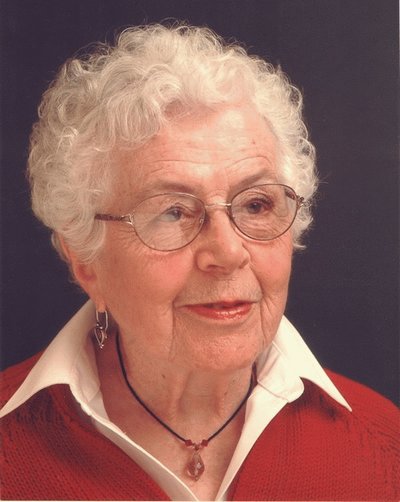November 13, 2008
Award-winning poet Madeline DeFrees to speak at Suzzallo Nov. 14
Poet Madeline DeFrees says she does a lot of her writing while she’s out walking or doing manual work. It’s a talent she picked up in the novitiate.
DeFrees, 88, spent nearly four decades as a nun with the Sisters of the Holy Names of Jesus and Mary, in Hillsboro, Ore. They went everywhere in twos and had little personal time, she said, “so I wrote while I was being a companion.
“I always felt like I shouldn’t be able to take time to write, because my time really belonged to the order,” she said. There was a rule of silence “so I would follow the swish of black serge beside me and work on poems in my head.” She still writes whole stanzas that way.
DeFrees is this year’s Maxine Cushing Gray Visiting Writer at UW Libraries and will give a lecture at 7 p.m. Friday, Nov. 14, in 101 Suzzallo as part of those duties. An informal reception will follow.
She said she’ll discuss her thesis that “every society develops a private language,” and will relate this to her own past. “My mother’s language was very dated. She dropped out of high school,” she said. “She never took the bus, she always took the ‘stage,’ and when she was in Portland she rode the ‘trolley.'” Due to the influence of her home, DeFrees said, “It took a long time before I could write poems that were clear.”
DeFrees is an accomplished poet and teacher. Her latest book of poetry, her eighth, titled Spectral Waves, was published by Copper Canyon Press in 2006. Both that and an earlier book Blue Dusk: New & Selected Poems 1964-2001 (also from Copper Canyon Press) won the Washington State Book Award. She has received both a Guggenheim Fellowship and a National Endowment for the Arts grant.
In addition to poetry, she has written journalism, essays, and two memoirs of her years as a nun. She said she has published “about 17 short stories,” the first of which was included in the well-known anthology Best American Short Stories in 1962. She said she has tried unsuccessfully to get her stories collected in a book, “but I feel quite confident they will be after I die.”
She actually started writing poetry at the age of 11. “I was in seventh grade and it was an assignment, to write a poem for Mother’s Day, so I did. An absolutely dreadful one that was proclaimed the best in the class, and after that I just always wrote.”
DeFrees earned a bachelor’s degree in English literature from Marylhurst College in 1948 and a master’s degree in journalism from the University of Oregon in 1951. She taught at Holy Names College in Spokane from 1950 to 1967, at the University of Montana from 1967 to 1979 and at the University of Massachusetts from 1979 to 1985 before she retired and moved to Seattle.
It was during her time in Montana, DeFrees said, that she decided to end her service as a nun. She was dispensed from her religious vows in 1973.
“I went to Montana to teach while I was still a nun but I had permission not to wear the habit. And once I learned how to do all the things most adults know how to do, I couldn’t think about going back to having to ask permission to leave the room,” she said.
As a nun in public, she said, “You’d either get this adulation or the opposite. One time I was on a bus — I always tried to keep away from people who wanted to sit next to nuns — one time a guy got to the front door and said, “Everybody on here can go to hell except the sister!”
DeFrees said she found it easier to relate to people when she stopped wearing the habit. She remains close to the church, however. “A lot of people who have left the convent bag the whole thing, but I’ve always felt when I needed help there was someone there for me. And my faith means a lot to me.”
DeFrees said she plans another volume of poetry, “but I don’t have an idea of how to unify it yet. I have maybe 10 or 12 poems but I need some idea to make it a book — instead of just a bunch of poems.”
She recently spoke to the creative writing class of English Professor Andrew Weld, discussing how poems should end. “A poem shouldn’t just stop or end,” she said. “It needs to be concluded.”
She’ll turn 89 on Nov. 18 but remains busy. She said she returned to Marylhurst for a Homecoming Weekend reading in October, and that she’ll spend three days with the Whidbey Writer’s Workshop in January.
It’s funny how she learned she had won the fellowship, she said. She was reading a biography of a Seattle painter, and “I had just come to a reference to (Northwest art critic and editor) Maxine Cushing Gray when the phone rang and somebody said, ‘Have you ever heard of Maxine Cushing Gray?'”
The lecture is open to the public, but reservations are requested by e-mailing Libraries Development at uwlibs@u.washington.edu or phoning 206-616-8397.



